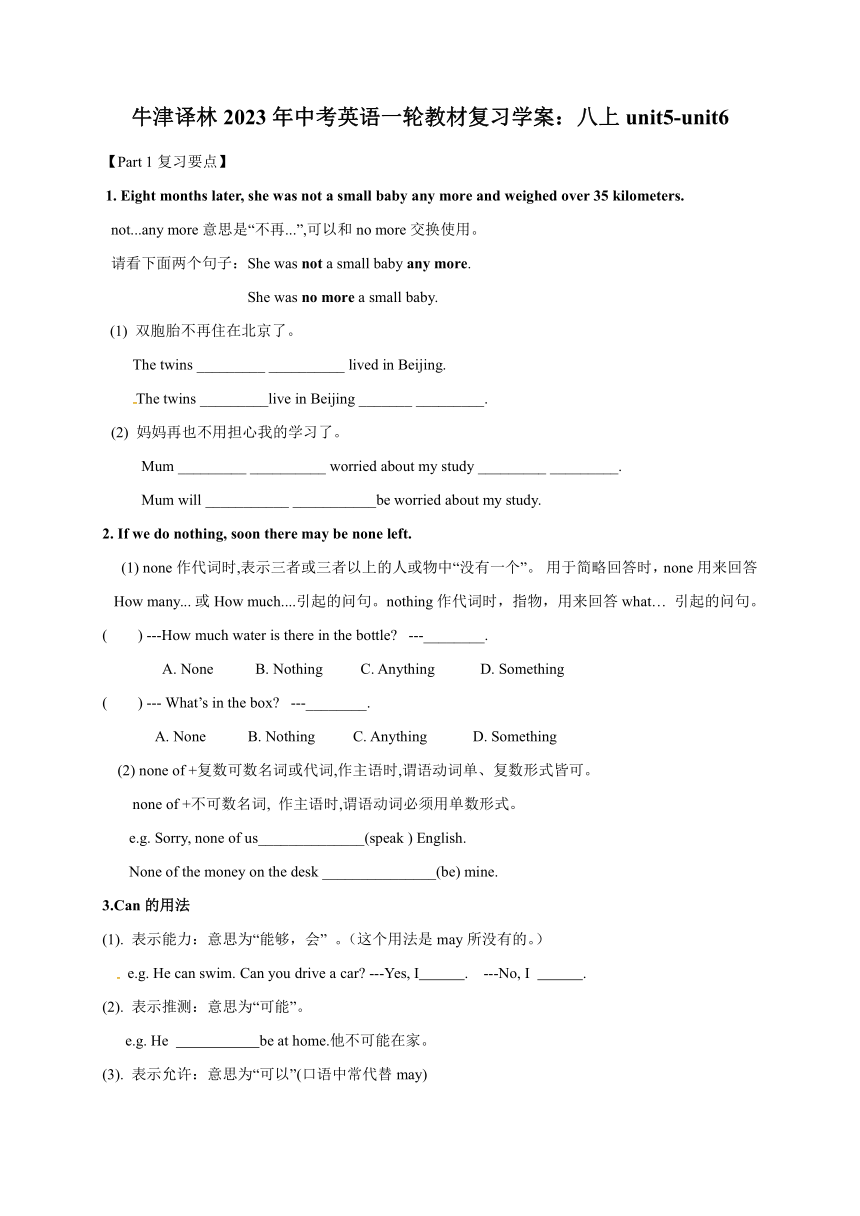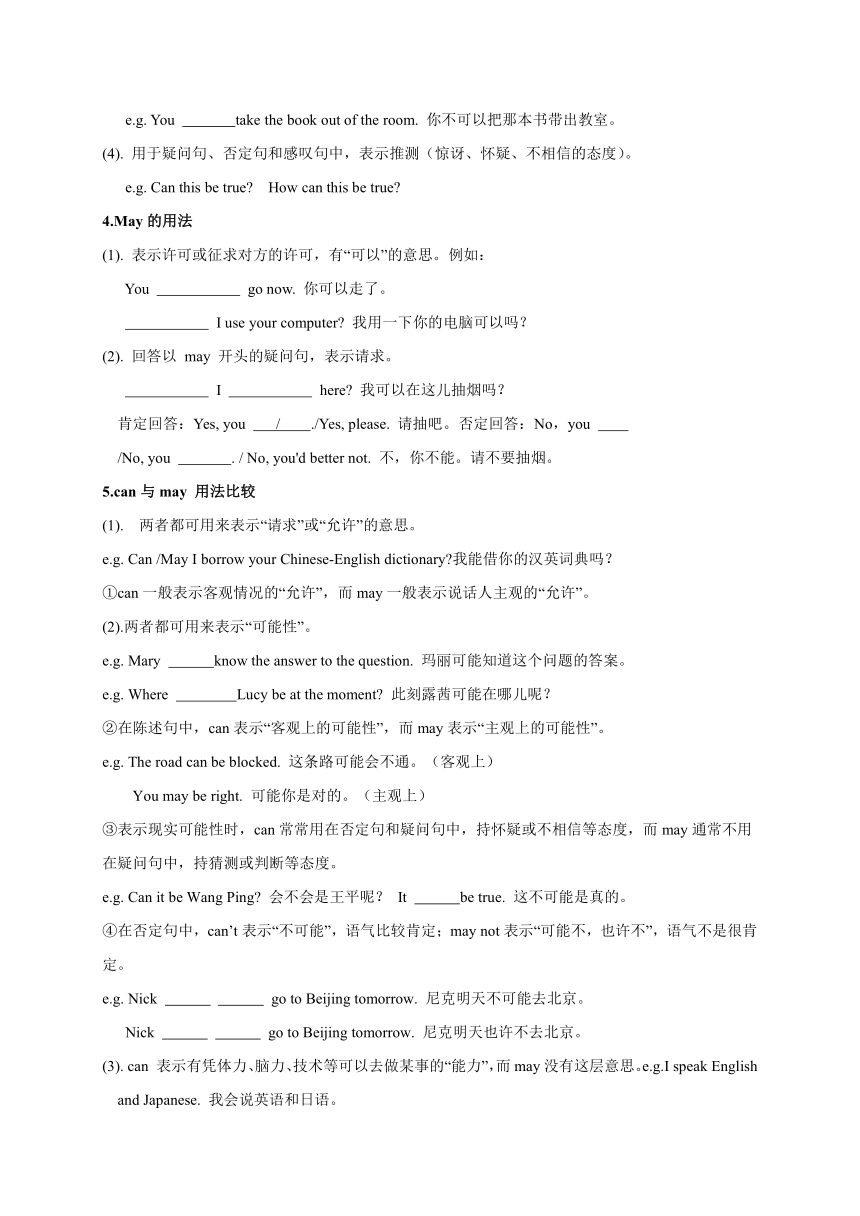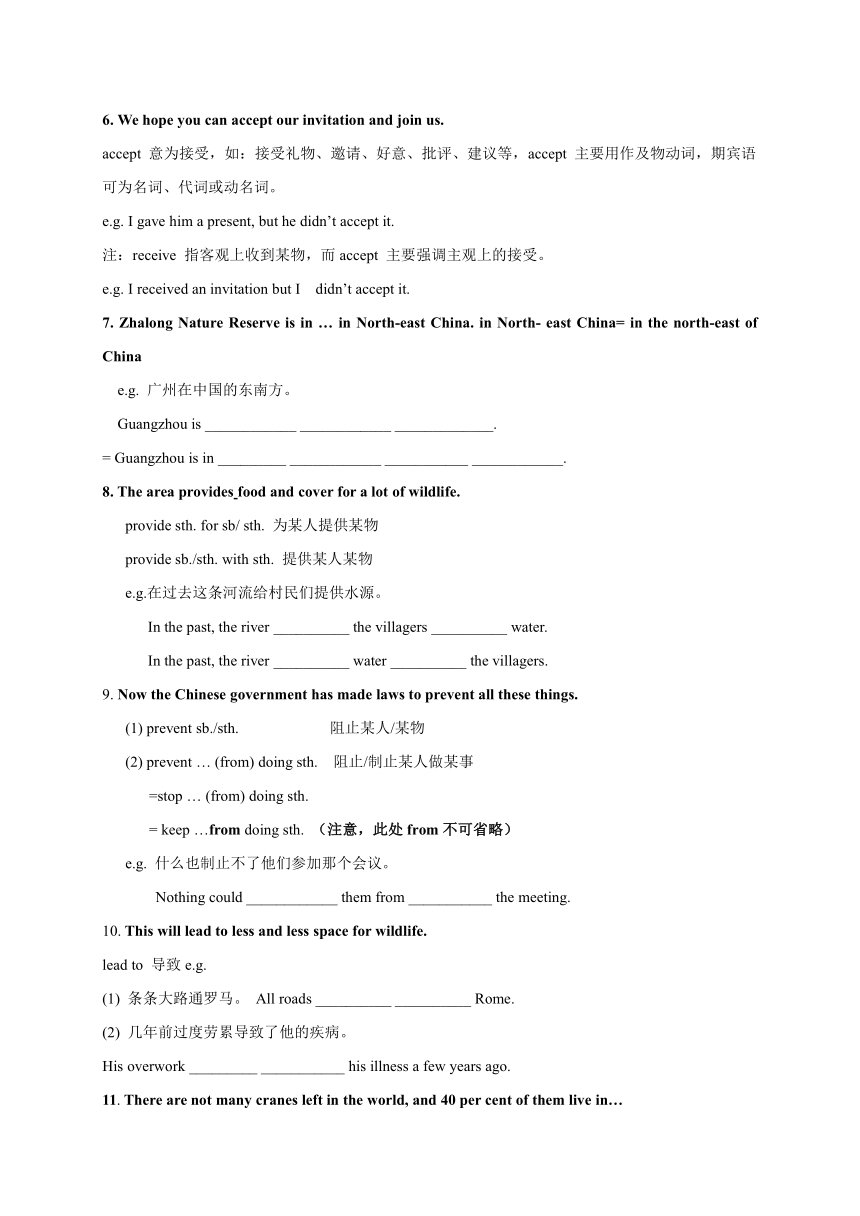牛津译林2023年中考英语一轮教材复习学案:八上Unit5—Unit6(word版,含答案)
文档属性
| 名称 | 牛津译林2023年中考英语一轮教材复习学案:八上Unit5—Unit6(word版,含答案) |  | |
| 格式 | docx | ||
| 文件大小 | 30.4KB | ||
| 资源类型 | 教案 | ||
| 版本资源 | 牛津译林版 | ||
| 科目 | 英语 | ||
| 更新时间 | 2023-06-10 07:22:08 | ||
图片预览



文档简介
牛津译林2023年中考英语一轮教材复习学案:八上unit5-unit6
【Part 1复习要点】
1. Eight months later, she was not a small baby any more and weighed over 35 kilometers.
not...any more意思是“不再...”,可以和no more交换使用。
请看下面两个句子:She was not a small baby any more.
She was no more a small baby.
(1) 双胞胎不再住在北京了。
The twins _________ __________ lived in Beijing.
The twins _________live in Beijing _______ _________.
(2) 妈妈再也不用担心我的学习了。
Mum _________ __________ worried about my study _________ _________.
Mum will ___________ ___________be worried about my study.
2. If we do nothing, soon there may be none left.
(1) none作代词时,表示三者或三者以上的人或物中“没有一个”。 用于简略回答时,none用来回答How many... 或How much....引起的问句。nothing作代词时,指物,用来回答what… 引起的问句。
( ) ---How much water is there in the bottle ---________.
A. None B. Nothing C. Anything D. Something
( ) --- What’s in the box ---________.
A. None B. Nothing C. Anything D. Something
(2) none of +复数可数名词或代词,作主语时,谓语动词单、复数形式皆可。
none of +不可数名词, 作主语时,谓语动词必须用单数形式。
e.g. Sorry, none of us______________(speak ) English.
None of the money on the desk _______________(be) mine.
3.Can的用法
(1). 表示能力:意思为“能够,会” 。(这个用法是may所没有的。)
e.g. He can swim. Can you drive a car ---Yes, I . ---No, I .
(2). 表示推测:意思为“可能”。
e.g. He be at home.他不可能在家。
(3). 表示允许:意思为“可以”(口语中常代替may)
e.g. You take the book out of the room. 你不可以把那本书带出教室。
(4). 用于疑问句、否定句和感叹句中,表示推测(惊讶、怀疑、不相信的态度)。
e.g. Can this be true How can this be true
4.May的用法
(1). 表示许可或征求对方的许可,有“可以”的意思。例如:
You go now. 你可以走了。
I use your computer 我用一下你的电脑可以吗?
(2). 回答以 may 开头的疑问句,表示请求。
I here 我可以在这儿抽烟吗?
肯定回答:Yes, you / ./Yes, please. 请抽吧。否定回答:No,you
/No, you . / No, you'd better not. 不,你不能。请不要抽烟。
5.can与may 用法比较
(1). 两者都可用来表示“请求”或“允许”的意思。
e.g. Can /May I borrow your Chinese-English dictionary 我能借你的汉英词典吗?
①can一般表示客观情况的“允许”,而may一般表示说话人主观的“允许”。
(2).两者都可用来表示“可能性”。
e.g. Mary know the answer to the question. 玛丽可能知道这个问题的答案。
e.g. Where Lucy be at the moment 此刻露茜可能在哪儿呢?
②在陈述句中,can表示“客观上的可能性”,而may表示“主观上的可能性”。
e.g. The road can be blocked. 这条路可能会不通。(客观上)
You may be right. 可能你是对的。(主观上)
③表示现实可能性时,can常常用在否定句和疑问句中,持怀疑或不相信等态度,而may通常不用在疑问句中,持猜测或判断等态度。
e.g. Can it be Wang Ping 会不会是王平呢? It be true. 这不可能是真的。
④在否定句中,can’t表示“不可能”,语气比较肯定;may not表示“可能不,也许不”,语气不是很肯定。
e.g. Nick go to Beijing tomorrow. 尼克明天不可能去北京。
Nick go to Beijing tomorrow. 尼克明天也许不去北京。
(3). can 表示有凭体力、脑力、技术等可以去做某事的“能力”,而may没有这层意思。e.g.I speak English and Japanese. 我会说英语和日语。
6. We hope you can accept our invitation and join us.
accept 意为接受,如:接受礼物、邀请、好意、批评、建议等,accept 主要用作及物动词,期宾语可为名词、代词或动名词。
e.g. I gave him a present, but he didn’t accept it.
注:receive 指客观上收到某物,而accept 主要强调主观上的接受。
e.g. I received an invitation but I didn’t accept it.
7. Zhalong Nature Reserve is in … in North-east China. in North- east China= in the north-east of China
e.g. 广州在中国的东南方。
Guangzhou is ____________ ____________ _____________.
= Guangzhou is in _________ ____________ ___________ ____________.
8. The area provides food and cover for a lot of wildlife.
provide sth. for sb/ sth. 为某人提供某物
provide sb./sth. with sth. 提供某人某物
e.g.在过去这条河流给村民们提供水源。
In the past, the river __________ the villagers __________ water.
In the past, the river __________ water __________ the villagers.
9. Now the Chinese government has made laws to prevent all these things.
(1) prevent sb./sth. 阻止某人/某物
(2) prevent … (from) doing sth. 阻止/制止某人做某事
=stop … (from) doing sth.
= keep …from doing sth. (注意,此处from不可省略)
e.g. 什么也制止不了他们参加那个会议。
Nothing could ____________ them from ___________ the meeting.
10. This will lead to less and less space for wildlife.
lead to 导致e.g.
(1) 条条大路通罗马。 All roads __________ __________ Rome.
(2) 几年前过度劳累导致了他的疾病。
His overwork _________ ___________ his illness a few years ago.
11. There are not many cranes left in the world, and 40 per cent of them live in…
There be sth/sb. left. 意为 “还剩下……物/人”, 为固定句式。
e.g. 屋子里什么也没留下。There _______ ________ _________ in the house.
per cent 名词,意为“百分之……”
注意:百分比与不可数名词或单数名词连用做主语时,谓语动词常为单数形式。
百分比与名词复数连用作主语时,谓语动词用复数形式。e.g.
(1) 百分之九十的工作完成了。Ninety percent of the work _____ finished now.
(2) 百分之六十的孩子喜欢快餐食品。Sixty per cent of the children ____ fast food.
12. 我们可用动词不定式做目的状语为了使表达更加清楚或对目的加以强调,还可以在动词前面用in order to。如:
1)他留在学校打扫教室。He at school the classroom.
2)为了听得更清楚,我要坐在前面。
I will sit in the front .
注意:由in order to引导的目的状语,既可以置于句尾,也可以置于句首。
13. 我们可以用动词不定式来说明宾语的情况,此时动词不定式在句中作宾语补足语。如:I want you (sing) a song for us.
动词不定式作宾语补足语,有带to和不带to两种形式。如:
My father asked me (post) a letter.
My mother made me (clean) my bedroom.
注意:1)常跟带to的动词不定式作宾语补足语的动词有:ask, tell, order, invite, get, allow, wish, want, encourage, advise, warn, like, love, hate等。
2)常跟不带to 的动词不定式作宾语补足语的动词有:感官动词hear, feel, see, watch, notice等;使役动词let, make和have。
3)动词help后面的动词不定式可带to,也可不带to。
【Part 2课堂巩固】
一、单项选择
( ) 1. ---Thanks for agreeing ________ me ________ your trip.
--- You’re welcome.
A. let; join B. to let; to join C. let; to join D. to let; join
( ) 2. I like to watch the birds ________ in the lake.
A. to fish B. fish C. fishes D. to fishing
( ) 3. ---______did you weigh when you were born
---My mother says I weighed only 3 kilos at birth.
A. What B. How much C. How many D. How heavy
( ) 4. --- Did you find it _____ to find your lost pen
--- Yes, I found it _____ on my bed.
A. easy; easy B. easily; easily C. easily; easy D. easy; easily
( ) 5. He _________a child_________.
is; not more B. isn’t; any more
C. doesn’t; any more D. is; any more
( ) 6. Mrs. Smith ___________ in the office. I saw her leave school just five minutes ago.
A. may not be B. can’t be C. mustn’t be D. needn’t be
( ) 7. The old man has no sons or daughters. He lives _________ and feels very _________.
A. alone; alone B. lonely; lonely C. lonely; alone D. alone; lonely
( ) 8. Only 20 per cent of the students _______ from other countries.
A. comes B. come C. coming D.will come
( ) 9. We can provide the best service _________ you.
A. to B. with C. for D. at
( )10. We will do everything we can ___________ the birds living here.
A. save B. to save C. saving D. to saving
二、词汇运用(根据句意及汉语提示,写出单词的正确形式,每空一词。)
1. Thank you very much for your (kind).
2.Don’t play this______________ game, or you will be in ____________(danger).
3.It’s difficult for me _____________ Physics well. (learn)
4.Please tell me the _____________ names. I want to interview them. (win)
5. We all know the _________________ of learning English. (important)
6. Tom is always ill. That’s because he takes a(n) __________ part in after-school activities.(act)
7. It’s not good to be an (不礼貌的) boy.
8. We should try our best ____________ people killing wild animals. (防止)
9. Can you see the words on the blackboard ___________(清晰地)
10.When spring comes, we should go out and enjoy the beauty of the ____________. (大自然)
三、同义句转换
1. Every year, a lot of people go to Zhalong to watch birds.
Every year, ___________people go_____________ in Zhalong.
2. There are fewer and fewer swans.
The number of swans is getting .
3. I like the parrot because it has colourful feathers.
I like the parrot ___________ __________ __________colorful feathers.
4. She can work out the problem easily.
________ ________ for ________ _______ work out the problem.
【Part 3拓展训练】
短文首字母填空
Most people love animals. We think that animals are good f 1 of humans. In fact, a large number of animals, especially w 2 ones, are in danger now mainly because of humans. If we do not take action now, we will have n 3 animals soon. People are destroying (破坏)animals’ natural shelter by c 4 down trees or building houses. Therefore, many of the animals’ living a 5 are becoming farmland. Besides, people h 6 animals for their fur or other useful things. Because of the pollution people caused (造成), some animals cannot l 7 a normal(正常的) life any more. We must try our best to p 8 animals right now. Remember that it is e 9 duty to do so. We should w 10 to newspapers and magazines and tell everyone about these problems. We should also do something to help the endangered animals at once before it is too late.
1. __________ 2. ___________ 3. _____________ 4. ___________ 5. ___________
6. __________ 7. ___________ 8. _____________ 9. ___________10. __________
【Part 1复习要点】
1. Eight months later, she was not a small baby any more and weighed over 35 kilometers.
not...any more意思是“不再...”,可以和no more交换使用。
请看下面两个句子:She was not a small baby any more.
She was no more a small baby.
(1) 双胞胎不再住在北京了。
The twins _________ __________ lived in Beijing.
The twins _________live in Beijing _______ _________.
(2) 妈妈再也不用担心我的学习了。
Mum _________ __________ worried about my study _________ _________.
Mum will ___________ ___________be worried about my study.
2. If we do nothing, soon there may be none left.
(1) none作代词时,表示三者或三者以上的人或物中“没有一个”。 用于简略回答时,none用来回答How many... 或How much....引起的问句。nothing作代词时,指物,用来回答what… 引起的问句。
( ) ---How much water is there in the bottle ---________.
A. None B. Nothing C. Anything D. Something
( ) --- What’s in the box ---________.
A. None B. Nothing C. Anything D. Something
(2) none of +复数可数名词或代词,作主语时,谓语动词单、复数形式皆可。
none of +不可数名词, 作主语时,谓语动词必须用单数形式。
e.g. Sorry, none of us______________(speak ) English.
None of the money on the desk _______________(be) mine.
3.Can的用法
(1). 表示能力:意思为“能够,会” 。(这个用法是may所没有的。)
e.g. He can swim. Can you drive a car ---Yes, I . ---No, I .
(2). 表示推测:意思为“可能”。
e.g. He be at home.他不可能在家。
(3). 表示允许:意思为“可以”(口语中常代替may)
e.g. You take the book out of the room. 你不可以把那本书带出教室。
(4). 用于疑问句、否定句和感叹句中,表示推测(惊讶、怀疑、不相信的态度)。
e.g. Can this be true How can this be true
4.May的用法
(1). 表示许可或征求对方的许可,有“可以”的意思。例如:
You go now. 你可以走了。
I use your computer 我用一下你的电脑可以吗?
(2). 回答以 may 开头的疑问句,表示请求。
I here 我可以在这儿抽烟吗?
肯定回答:Yes, you / ./Yes, please. 请抽吧。否定回答:No,you
/No, you . / No, you'd better not. 不,你不能。请不要抽烟。
5.can与may 用法比较
(1). 两者都可用来表示“请求”或“允许”的意思。
e.g. Can /May I borrow your Chinese-English dictionary 我能借你的汉英词典吗?
①can一般表示客观情况的“允许”,而may一般表示说话人主观的“允许”。
(2).两者都可用来表示“可能性”。
e.g. Mary know the answer to the question. 玛丽可能知道这个问题的答案。
e.g. Where Lucy be at the moment 此刻露茜可能在哪儿呢?
②在陈述句中,can表示“客观上的可能性”,而may表示“主观上的可能性”。
e.g. The road can be blocked. 这条路可能会不通。(客观上)
You may be right. 可能你是对的。(主观上)
③表示现实可能性时,can常常用在否定句和疑问句中,持怀疑或不相信等态度,而may通常不用在疑问句中,持猜测或判断等态度。
e.g. Can it be Wang Ping 会不会是王平呢? It be true. 这不可能是真的。
④在否定句中,can’t表示“不可能”,语气比较肯定;may not表示“可能不,也许不”,语气不是很肯定。
e.g. Nick go to Beijing tomorrow. 尼克明天不可能去北京。
Nick go to Beijing tomorrow. 尼克明天也许不去北京。
(3). can 表示有凭体力、脑力、技术等可以去做某事的“能力”,而may没有这层意思。e.g.I speak English and Japanese. 我会说英语和日语。
6. We hope you can accept our invitation and join us.
accept 意为接受,如:接受礼物、邀请、好意、批评、建议等,accept 主要用作及物动词,期宾语可为名词、代词或动名词。
e.g. I gave him a present, but he didn’t accept it.
注:receive 指客观上收到某物,而accept 主要强调主观上的接受。
e.g. I received an invitation but I didn’t accept it.
7. Zhalong Nature Reserve is in … in North-east China. in North- east China= in the north-east of China
e.g. 广州在中国的东南方。
Guangzhou is ____________ ____________ _____________.
= Guangzhou is in _________ ____________ ___________ ____________.
8. The area provides food and cover for a lot of wildlife.
provide sth. for sb/ sth. 为某人提供某物
provide sb./sth. with sth. 提供某人某物
e.g.在过去这条河流给村民们提供水源。
In the past, the river __________ the villagers __________ water.
In the past, the river __________ water __________ the villagers.
9. Now the Chinese government has made laws to prevent all these things.
(1) prevent sb./sth. 阻止某人/某物
(2) prevent … (from) doing sth. 阻止/制止某人做某事
=stop … (from) doing sth.
= keep …from doing sth. (注意,此处from不可省略)
e.g. 什么也制止不了他们参加那个会议。
Nothing could ____________ them from ___________ the meeting.
10. This will lead to less and less space for wildlife.
lead to 导致e.g.
(1) 条条大路通罗马。 All roads __________ __________ Rome.
(2) 几年前过度劳累导致了他的疾病。
His overwork _________ ___________ his illness a few years ago.
11. There are not many cranes left in the world, and 40 per cent of them live in…
There be sth/sb. left. 意为 “还剩下……物/人”, 为固定句式。
e.g. 屋子里什么也没留下。There _______ ________ _________ in the house.
per cent 名词,意为“百分之……”
注意:百分比与不可数名词或单数名词连用做主语时,谓语动词常为单数形式。
百分比与名词复数连用作主语时,谓语动词用复数形式。e.g.
(1) 百分之九十的工作完成了。Ninety percent of the work _____ finished now.
(2) 百分之六十的孩子喜欢快餐食品。Sixty per cent of the children ____ fast food.
12. 我们可用动词不定式做目的状语为了使表达更加清楚或对目的加以强调,还可以在动词前面用in order to。如:
1)他留在学校打扫教室。He at school the classroom.
2)为了听得更清楚,我要坐在前面。
I will sit in the front .
注意:由in order to引导的目的状语,既可以置于句尾,也可以置于句首。
13. 我们可以用动词不定式来说明宾语的情况,此时动词不定式在句中作宾语补足语。如:I want you (sing) a song for us.
动词不定式作宾语补足语,有带to和不带to两种形式。如:
My father asked me (post) a letter.
My mother made me (clean) my bedroom.
注意:1)常跟带to的动词不定式作宾语补足语的动词有:ask, tell, order, invite, get, allow, wish, want, encourage, advise, warn, like, love, hate等。
2)常跟不带to 的动词不定式作宾语补足语的动词有:感官动词hear, feel, see, watch, notice等;使役动词let, make和have。
3)动词help后面的动词不定式可带to,也可不带to。
【Part 2课堂巩固】
一、单项选择
( ) 1. ---Thanks for agreeing ________ me ________ your trip.
--- You’re welcome.
A. let; join B. to let; to join C. let; to join D. to let; join
( ) 2. I like to watch the birds ________ in the lake.
A. to fish B. fish C. fishes D. to fishing
( ) 3. ---______did you weigh when you were born
---My mother says I weighed only 3 kilos at birth.
A. What B. How much C. How many D. How heavy
( ) 4. --- Did you find it _____ to find your lost pen
--- Yes, I found it _____ on my bed.
A. easy; easy B. easily; easily C. easily; easy D. easy; easily
( ) 5. He _________a child_________.
is; not more B. isn’t; any more
C. doesn’t; any more D. is; any more
( ) 6. Mrs. Smith ___________ in the office. I saw her leave school just five minutes ago.
A. may not be B. can’t be C. mustn’t be D. needn’t be
( ) 7. The old man has no sons or daughters. He lives _________ and feels very _________.
A. alone; alone B. lonely; lonely C. lonely; alone D. alone; lonely
( ) 8. Only 20 per cent of the students _______ from other countries.
A. comes B. come C. coming D.will come
( ) 9. We can provide the best service _________ you.
A. to B. with C. for D. at
( )10. We will do everything we can ___________ the birds living here.
A. save B. to save C. saving D. to saving
二、词汇运用(根据句意及汉语提示,写出单词的正确形式,每空一词。)
1. Thank you very much for your (kind).
2.Don’t play this______________ game, or you will be in ____________(danger).
3.It’s difficult for me _____________ Physics well. (learn)
4.Please tell me the _____________ names. I want to interview them. (win)
5. We all know the _________________ of learning English. (important)
6. Tom is always ill. That’s because he takes a(n) __________ part in after-school activities.(act)
7. It’s not good to be an (不礼貌的) boy.
8. We should try our best ____________ people killing wild animals. (防止)
9. Can you see the words on the blackboard ___________(清晰地)
10.When spring comes, we should go out and enjoy the beauty of the ____________. (大自然)
三、同义句转换
1. Every year, a lot of people go to Zhalong to watch birds.
Every year, ___________people go_____________ in Zhalong.
2. There are fewer and fewer swans.
The number of swans is getting .
3. I like the parrot because it has colourful feathers.
I like the parrot ___________ __________ __________colorful feathers.
4. She can work out the problem easily.
________ ________ for ________ _______ work out the problem.
【Part 3拓展训练】
短文首字母填空
Most people love animals. We think that animals are good f 1 of humans. In fact, a large number of animals, especially w 2 ones, are in danger now mainly because of humans. If we do not take action now, we will have n 3 animals soon. People are destroying (破坏)animals’ natural shelter by c 4 down trees or building houses. Therefore, many of the animals’ living a 5 are becoming farmland. Besides, people h 6 animals for their fur or other useful things. Because of the pollution people caused (造成), some animals cannot l 7 a normal(正常的) life any more. We must try our best to p 8 animals right now. Remember that it is e 9 duty to do so. We should w 10 to newspapers and magazines and tell everyone about these problems. We should also do something to help the endangered animals at once before it is too late.
1. __________ 2. ___________ 3. _____________ 4. ___________ 5. ___________
6. __________ 7. ___________ 8. _____________ 9. ___________10. __________
